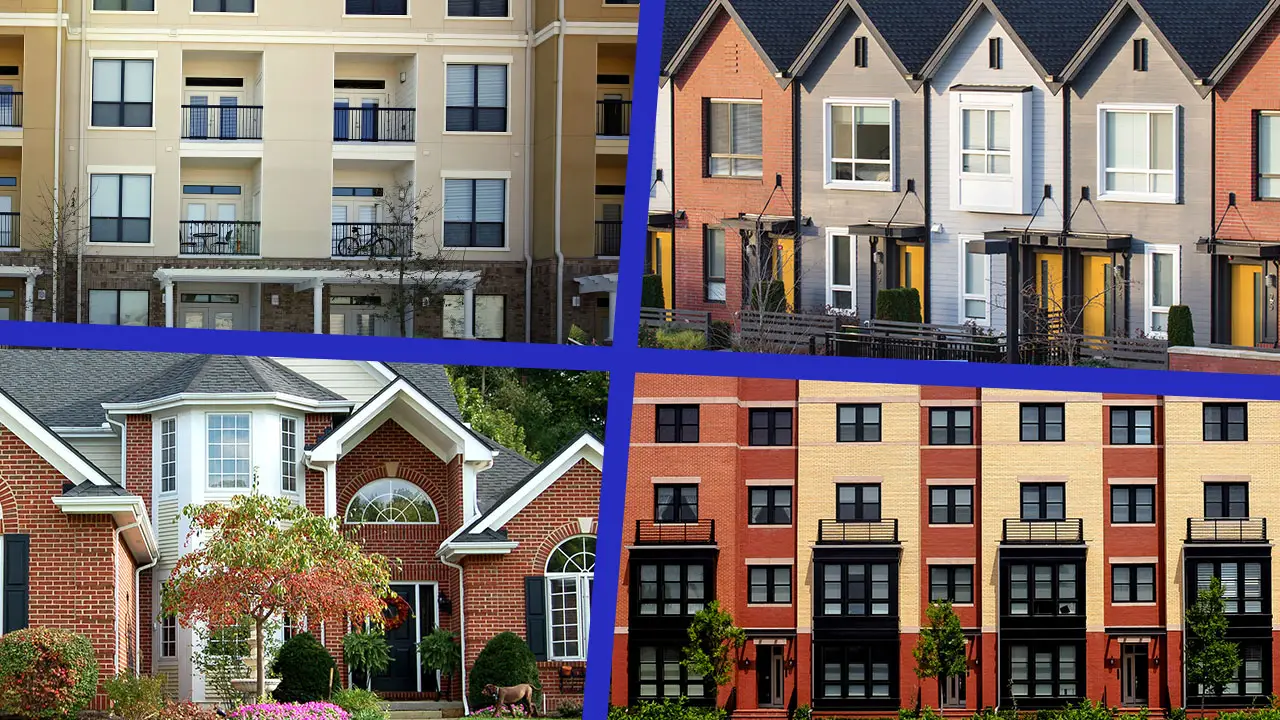If you’re exploring housing options, one of the first comparisons you’ll make is condo vs townhouse. These property types may look similar, but they differ significantly in ownership, maintenance, and financing. This guide also explains PUDs and twinhomes, helping you make an informed decision.
Condo vs Townhouse: Key Ownership and Maintenance Differences
While they may look similar from the outside, condos and townhouses differ significantly when it comes to ownership structure and responsibility.
| Feature | Condo | Townhouse |
|---|---|---|
| Ownership | You own the interior only | You own the structure + land |
| HOA Responsibilities | Exterior, roof, landscaping | Often just shared areas |
| Insurance Type | Condo (walls-in) insurance | Standard homeowners insurance |
| Maintenance | HOA maintains exterior | Homeowner maintains roof/siding |
| Mortgage Considerations | Stricter lending and PMI may apply | Fewer restrictions, easier financing |
| Monthly HOA Fees | Typically higher | Generally lower |
Condos are ideal for those who want low-maintenance living, while townhomes offer more autonomy with slightly more upkeep.
What Is a PUD (Planned Unit Development)?
A Planned Unit Development (PUD) may look like a condo or townhome, but its legal and ownership structure is different. In a PUD, you typically own both the home and the land beneath it, and the HOA may cover certain community elements like landscaping or shared amenities.
From a lending perspective, PUDs are usually treated like single-family homes, which makes them easier to finance than condos. Lenders don’t typically require project approval or condo reviews for PUDs.
You can read more about eligibility requirements for units in PUD projects in Fannie Mae’s official Selling Guide.
What Is a Twinhome?
A twinhome is a specific type of duplex where each unit is separately owned. Unlike condos, you own the structure and the land, and there is no shared HOA unless one is voluntarily formed by the neighbors.
Think of a twinhome as a “half-house” that shares one wall but functions like a single-family home for financing and insurance purposes.
How These Property Types Affect Your Mortgage
Different property types can influence:
-
Down payment requirements
-
PMI (Private Mortgage Insurance)
-
Interest rates
-
HOA dues included in DTI
For example, condos often require higher down payments or PMI due to lending risk. You may also need a limited or full condo review during underwriting.
Learn how to reduce PMI costs on condos, or use our Loan Affordability Calculator to see your buying power.
Which Property Type Is Best for You?
Choosing between a condo vs townhouse comes down to how much responsibility you want as a homeowner. Do you prefer a low-maintenance lifestyle, or do you want full control over your home’s exterior and land?
| You Prefer… | Consider This Type |
|---|---|
| Low maintenance, community amenities | Condo or PUD |
| More ownership freedom, small yard | Townhome |
| Less HOA involvement, shared wall | Twinhome |
| No shared walls, full control | Single-family home |
Ownership and Legal Questions
What’s the main difference between a condo and a townhome?
A condo owner holds title to the interior of the unit, while a townhome owner holds title to both the unit and the land it sits on. This affects maintenance, insurance, and control.
Is a PUD the same as a townhome or condo?
Not exactly. A PUD may look like either but is legally distinct. You typically own both land and structure, and financing is usually easier than for a condo.
Is a twinhome a duplex?
They’re similar, but a twinhome is separately owned on each side — usually with no shared utilities or joint ownership agreement.
Financing and Mortgage Questions
Are condos harder to finance than townhomes?
Yes. Condos often require lender approval of the HOA and reserve funds. You may also need a higher down payment or mortgage insurance.
Do HOA fees affect how much house I can afford?
Yes. Lenders include HOA dues in your debt-to-income ratio (DTI), which can lower your approved loan amount.
Do all these property types qualify for FHA or VA loans?
Most do, but condos must appear on an approved list for FHA or VA eligibility. PUDs and townhomes are generally more flexible.
Final Thoughts
Choosing between a condo vs townhouse, or understanding less common options like PUDs and twinhomes, comes down to your personal preferences, financial goals, and how much responsibility you want as a homeowner. Ownership structure, HOA rules, maintenance expectations, and financing requirements all play a role in your decision.
If you’re unsure what type of loan might suit your situation — especially when comparing requirements for condos, townhomes, or PUDs — try Loan Compass. It evaluates your financial profile and helps identify whether Conventional, FHA, VA, or USDA loans could be a good fit based on your background.
The property you choose should support both your lifestyle and your long-term financial strategy — and understanding the differences now puts you in control of that decision.
Related Posts

Financing High-Rise Condos: What Makes Condo Mortgages Different (and Riskier)
Buying a condo might seem like a simpler path to homeownership — especially in urban areas where high rise buildings dominate the skyline.

Condo vs Townhouse: Which Is the Smarter Buy for Long-Term Value?
If you’ve narrowed your home search down to a condo or a townhouse, you’re already well ahead of most first-time buyers. But the

The Hidden Costs of Homeownership: What You Need to Know Before You Buy
Buying a home is a major milestone, but many buyers focus only on the monthly mortgage payment. In reality, the cost of owning

